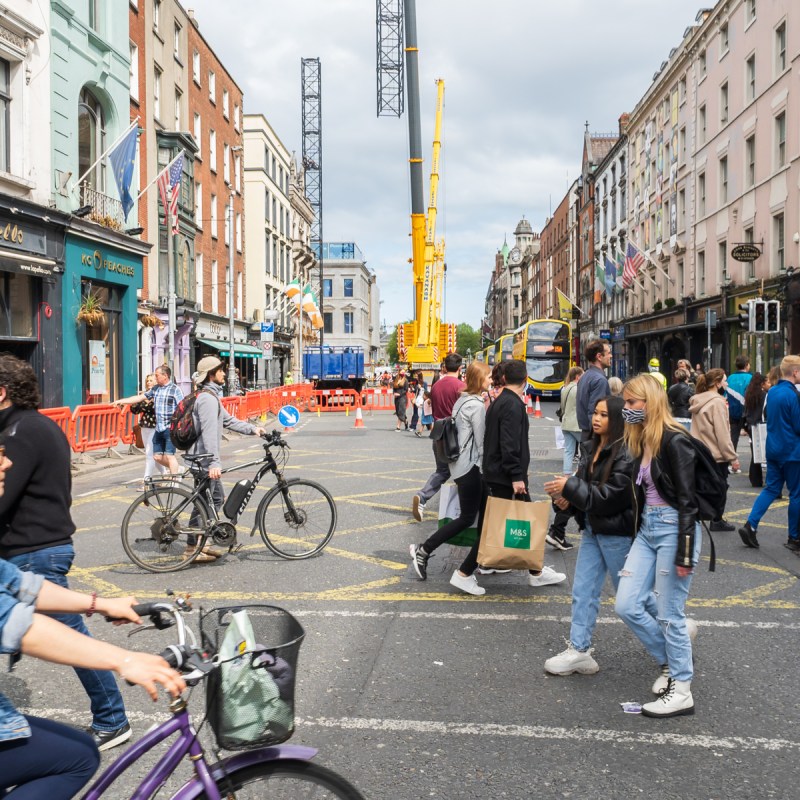
The coronavirus pandemic has prevented free travel into Dublin, Ireland since March 2020. When I returned home to Dublin in May, I lucked out by traveling from one of the few non-level 2 countries (Belize) so I was able to enter without hotel quarantine. But bars didn’t open for outdoor service until mid-May, and libraries and museums were just starting to open when I returned to the United States in June.
Videos by TravelAwaits
Following the example of the European Union’s digital COVID-19 certificate, Ireland will welcome EU/EEA and fully vaccinated American travelers without quarantine or pre-departure COVID-19 tests starting July 19. You will need to carry proof of vaccination.
Dropping the quarantine restrictions allows US and UK citizens to tour freely through the Republic of Ireland again. Tourism is a major portion of Ireland’s GDP, which helps explain why the state is willing to trial the effects of the COVID-19 vaccine. They don’t expect large groups of tourists right away but will allow small groups and families to resume their explorations of the Emerald Isle.
Unvaccinated tourists are still welcome conditionally. They must arrive with a negative COVID 19 test and self-quarantine (not mandatory hotel quarantine) until a second test is obtained (and negative) no sooner than 5 days after arriving in Ireland.
Where To Get Tested
While in Dublin, one of the easier places to get tested for COVID-19 is at a Boots Pharmacy or the Travel Medicine clinic on Dawson Street. You can also arrange it using an HSE walk-in testing center here or near the Dublin, Cork, and Shannon airports. Expect to pay about 150 euros.
These facilities are also available to schedule your COVID-19 test that you’ll need to return to the United States. Since you’ll already know when you’ll return home, schedule your test before you arrive.
Children between 7 and 18 years of age who have not been vaccinated will need a negative COVID-19 test prior to being allowed into the country. The government of Ireland’s website continues to state any unvaccinated person over the age of 2 needs to have a negative COVID-19 test to enter.
What’s Open?
According to a May 28, 2021, article in The Irish Times, the Cabinet approved plans for a resumption of international travel this summer with the approval of Taoiseach Micheal Martin. The U.S., UK, France, Belgium, and Luxembourg will be taken off the list for mandatory hotel quarantine.
Minister for Transport Eamon Ryan explained that “introducing the travel scheme from July 1 allows six weeks for member states to introduce the travel cert. The digital green cert will allow people to travel if they are fully vaccinated, have a negative PCR test or can show they have recently recovered from COVID-19.”
Starting July 5, limited indoor dining at bars and restaurants resumed as did arts and sports events. These can be both indoors and outdoors but could have attendance restrictions.
From July 5, up to three households can gather together regardless of vaccination status.
Wedding attendance can increase to 50 people indoors in July and 100 in August.
In August, large venues like Croke Park can operate at 25 percent capacity or 5,000 people, whichever is smaller.
Most restaurants and bars are expected to fully open July 19. The July 6 Irish Times article reports, “Senior Government officials met with representatives of restaurateurs and publicans as part of efforts to develop a system of verifying that a person is vaccinated as ought by the National Public Health Emergency Team (Nphet). The delay in restaurant and pub indoor service resumption caused by the threat posed by the Delta variant.”
They continue discussions about the value of 1.8 million vaccine passes that could be sent out as a means of proving a person had been vaccinated. Having this via letter or email to allow entry to allow indoor dining. The legality of its use to access domestic services remains in question. They continue to meet and review additional options.

What To Do Once You’re There
During my month in Dublin, I spent more time walking through different neighborhoods than I ever had before. You’ll want to take advantage of all the open-air spaces and surprising nature Dublin has to offer.
Whether you choose to go to the beaches, the museums, the gardens, or memorials, there are plenty of things to do. More places to go can be found here.
Expect to request online reservations for museum entry for at least another month. There is no entry fee, but large groups will still not be allowed based on current information.
Train service is expected to increase as the need arises. If you have the chance, go north to Skerries or Howth or south to Dalkey for great coastal walks.
Download the appropriate DART or Luas or Bus app on your phone and have the MyTaxi app downloaded prior to departing for Dublin in case you get caught farther from your hotel than you expected.
Do expect to wear a mask in taxis and on public transit for the immediate future.
Inter-city and inter-county restrictions have been lifted, but the government of Ireland continues to recommend people wear masks outside where there is heavier foot traffic or expected crowds.
Before You Go
- Complete the Passenger Locator Form. Do not Google for the form and try to fill it out online, say, prior to departing Amsterdam like I did. There is not meant to be a charge for this form, and that online service is a scam. (I got caught in it returning to Dublin in May and was told at Border Protection that the service is not related to the government of Ireland and never received a refund.) Instead, use the official link here.
- Have proof of vaccination.
- Schedule your COVID-19 test for return to the U.S.

More On Covid-19 In Ireland
Please note that Ireland does still have confirmed COVID-19 cases within its borders. The last outbreak in March was thought to be due to new variants and led to the repeat shutdown that relaxed in May. The Irish Times July 6, 2021 issue reported 365 new cases in the State as the number of COVID-19 Delta variant incidences increases.
While 4.37 million doses have been administered in Ireland, only 1.79 million Irish citizens are completely vaccinated, a little more than one third. HSE chief executive Paul Reid stated that the best-case scenario for vaccine delivery is half what was expected, but most of the vaccine doses received have been administered.
To check the recent U.S. Embassy recommendations about travel to Ireland, click here.
According to the Department of the Taoiseach (head of the government of Ireland, equivalent to a prime minister), following July 18, the government of Ireland continues to advise citizens to “travel safely and in accordance with public health guidelines.”
With thoughtful consideration, you can have a wonderful Irish vacation before the crowds descend en masse.
